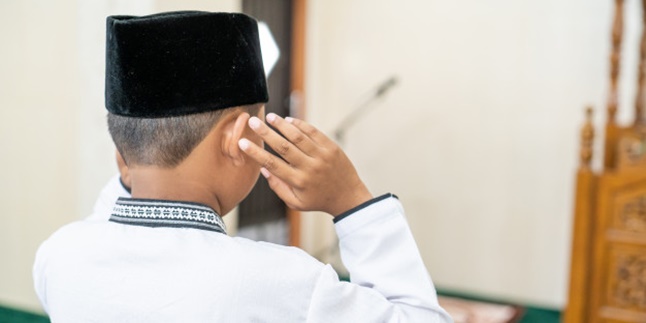7 Activities that Can be Done at Home during Lebaran
Here are 7 activities that can be done at home during Lebaran. Let's check them out KLovers.

Kapanlagi.com - When someone is looking for a way to pay off obligatory prayers or commonly known as qadha prayers, it means that the person has realized the consequences of neglecting prayers. The debt of obligatory prayers is equal to other obligations to Allah that must be fulfilled.
This method of paying off obligatory prayers has many versions. This is related to whether someone intentionally or unintentionally neglects prayers. Someone who intentionally neglects prayers should remember that prayers are the pillar of religion. Allah SWT says:
"Indeed, prayer is an obligation on the believers at fixed times." (Quran, An-Nisa: 103)
For those who are truly aware of their faith, they will strive not to neglect their obligations. However, Allah SWT is the Most Forgiving, so there is a way to pay off obligatory prayers as a solution. To find out more about this, let's take a look at the explanation of how to pay off obligatory prayers from various sources below.

Prayer (Credit: Freepik)
Prayer for Muslims is an obligation that must be performed on time, in any condition. If you can't stand, sit. If you can't sit, lie down. If you can't lie down, use eye signals. If you can't use eye signals, use your heart. That's how easy Islamic law is, but that ease is still felt heavy by those who like to be lazy.
In addition, there is also negligence that can result in missing prayer time. Therefore, there are rules for paying off obligatory prayer debts. However, before delving into the procedure for paying off these debts, it would be better for you to know the history of the obligation of prayer for Muslims as a preventive measure to be more cautious in performing worship.
Prayer is the earliest worship, which was also performed by the prophets before Prophet Muhammad. However, it was during the time of Prophet Muhammad that all the movements and prayers in prayer were gathered, from standing, bowing, prostrating, to sitting.
The command to pray 5 times a day was later given by Allah to Prophet Muhammad during the Isra and Mi'raj event, which occurred about 18 months before the hijrah event. This event is recorded in the hadith of the Prophet narrated by Bukhari (No. 342) and Muslim (No. 163):
"Indeed, the Messenger of Allah, may peace be upon him, said:
'The roof of my house was opened while I was in Mecca, then Gabriel descended and he held my hand and raised me to the sky, then Allah obligated 50 prayers for my Ummah... so I returned, and He (Allah) said:
'The 5 daily prayers are equivalent to the reward of 50 prayers, and My statement will not be replaced.'"

Prayer debt (Credit: Freepik)
Based on information reported by nu.or.id, the scholars agreed that the way to pay off missed obligatory prayers is mandatory for those who are negligent and leave them.
"The scholars agree that paying off the missed prayers is obligatory, whether due to forgetfulness or sleep. As the Prophet said: Sleep is not negligence, negligence is when someone does not sleep. If one forgets or falls asleep and does not perform the prayer, then pray when you remember." (Refer to Fiqhus Sunnah, Volume II, p. 185)
The way to pay off missed obligatory prayers is to do it during free time. However, it is better to pay off the missed prayers as soon as possible. For example, if you have just missed the Fajr prayer because you woke up late, the best time to perform it is at seven or eight in the morning when you wake up from sleep, or when you have the opportunity to do so and there is no need to delay it. Although, in principle, the debt (qadha) of the Fajr prayer can be performed at the time of Dhuhr, Maghrib, Asr, or anytime.
The debt of prayers can be paid off in two ways. The first way is to have a family member perform them on behalf of the person; and the second way is to pay fidyah (penalty), which is equivalent to 6 ounces of rice or other staple food for each missed prayer. So, the family must pay 6 ounces of rice x 5 x 7 and give it to the poor neighbors.
"If someone who has passed away has a debt of prayers, it is not necessary for it to be made up. But according to most Mujtahidin scholars, the family still has the obligation to pay because there is a hadith narrated by Imam Bukhari, etc. Apparently, this last opinion tends to be followed by scholars, including Imam Subki and some of his companions." (See Ahkamul Fuqoha, Vol. II, page 50)
"...the correct opinion is the first fatwa which states that one must give fidyah (fine) of 40 mud (1 mud = 6 ounces) for those who have abandoned prayers for 8 days, which they should have performed 5 times a day." (See I'anatut Thalibin, Vol. II, page 229).
Paying off obligatory prayer debt is exactly the same as performing the missed prayer in terms of nature and procedure. For example, if someone misses the Fajr prayer because they overslept, then they are obligated to make up for it by performing the same prayer as the Fajr prayer.
In the procedure of paying off obligatory prayer debt, there is no specific intention that needs to be uttered when making up for the prayer. Therefore, when someone just remembers that they have missed a prayer or just wakes up from sleep while the prayer time has passed, what they do is immediately perform ablution, then find a clean and pure place for prayer.
Just like in regular prayer, they face the qibla and then perform the prayer with the same procedure and nature as the missed prayer. If there is more than one missed prayer, then after the salutation, they stand up again to make up for the next prayer.
Sheikh Muhammad bin Salih Al Uthaymeen answered this question:
"All of them should be performed at once, because the Prophet (peace be upon him) when he missed several prayers during the Battle of the Trench, he performed all of them before Maghrib. And this is what should be done by every person who has missed their prayers, which is to perform all of them at once without delaying them."
That is the explanation of how to pay off obligatory prayer debt that you can refer to for understanding when you feel negligent in missing prayer times.
(kpl/ans)
Cobain For You Page (FYP) Yang kamu suka ada di sini,
lihat isinya
Here are 7 activities that can be done at home during Lebaran. Let's check them out KLovers.
These are 7 healthy drink ideas suitable for serving during Eid amidst the Covid-19 pandemic. Let's check it out KLovers.
Making vegetable pickle is considered very easy and simple. Let's check out the following vegetable pickle recipes, KLovers!
This is the danger of weight gain, these are 7 Tips for Managing Eating Patterns After Ramadan Fasting. Let's check it out KLovers.
Not only becoming a loser, leaving the five daily prayers also has a great sin because it is a mandatory worship. Check out the following explanation KLovers.
Here is the etiquette and intention of slaughtering chickens and its explanation in Islam that you can learn about.
Here are some simple to traditional Balinese plecing kangkung recipes that stimulate the appetite.
Here are 6 tips to keep children healthy at the end of Ramadan fasting. Let's check it out, KLovers.
Here are some practical purple sweet potato recipes, delicious homemade dishes that you can try.
No need to go all the way to Medan to enjoy bika ambon. You can make it yourself by following various bika ambon recipes.
There are several spinach vegetable recipes that can be made, starting from spinach salad, gado-gado, spinach chips, or clear spinach soup. Let's check out the review, KLovers!
The procedure for Hajj and its sequence begins with Ihram and ends with Tawaf Wada. At the time of Ihram, there is a recitation of the Hajj intention that needs to be practiced by Muslims. Let's take a look at the explanation, KLovers!